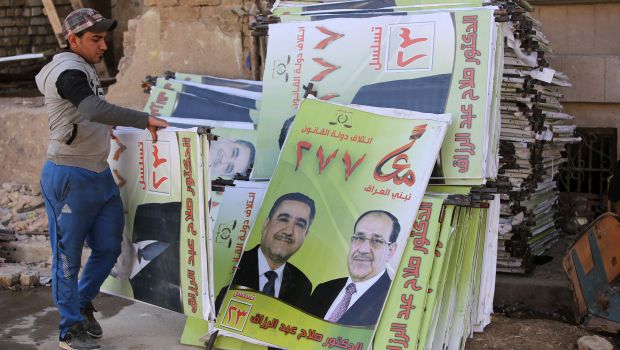
An Iraqi printing house employee puts together campaign posters showing former Baghdad governor Salah Abdul Razzaq and Iraqi Prime Minister Nuri Al-Maliki (R) in Baghdad on March 31, 2014. (AFP PHOTO/AHMAD AL-RUBAYE)
Baghdad, Asharq Al-Awsat—A political adviser to Iraqi Prime Minister Nuri Al-Maliki reiterated his State of Law coalition’s controversial campaign slogan that it will seek a “political majority government” in legislative elections on April 30.
In comments to Asharq Al-Awsat, Maliki’s adviser, Mariam Al-Rais said: “If the State of Law coalition wins, the biggest objective of the next government will be to form a political majority government with the participation of other parties and implement a reform of the political system in Iraq,” she said, calling for a Western-style political opposition in Iraq.
But the State of Law Coalition’s calls for “change” and the formation of a “political majority government” have come in for criticism from Maliki’s opponents, who say the prime minister is simply seeking to cling to power after two terms in office.
Iraqi Umma Party leader Mitahl Al-Alusi told Asharq Al-Awsat that this slogan is part of a wider plan “to reproduce the sectarian and ethnic quota system, but in a diluted manner.”
“Everybody wants change due to their dissatisfaction with the current situation, but there is a difference between what the people want and what the corrupt and failed politicians want, namely to protect their own interests,” Alusi continued.
Maliki secured a second term in office in 2010 at the head of a broad National Alliance, including his own State of Law coalition, as well as the Islamic Supreme Council of Iraq (ISCI), the Sadrist Movement, the Islamic Virtue Party and the Badr Organization, among others. This coalition has disintegrated in the run-up to these elections, with Moqatda Al-Sadr in particular strongly criticizing the prime minister’s performance.
In a press conference last week, Sadr called on Maliki not to run for a third term. He said: “Brother Maliki thinks he served Iraq. Let him rest for four years, and see if whoever comes next would serve better.”
Rais agreed that the National Alliance that brought Maliki to office had crumbled: “Moqtada Al-Sadr said that the Sadrist bloc is not part of any alliance . . . and the ISCI, led by Ammar Al-Hakim, has its own programs and alliances.”
“What I know is that the State of Law coalition is not currently coordinating with the National Alliance,” she added.
